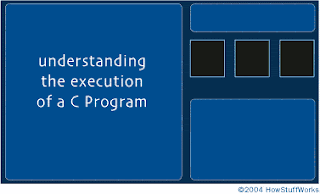This animation shows the execution of a simple C program.
The C programming language is a popular and widely used programming language for creating computer programs. Programmers around the world embrace C because it gives maximum control and efficiency to the programmer.
History:
C was developed at Bell Laboratories in 1972 by Dennis Ritchie. Many of its principles and ideas were taken from the earlier language B and B's earlier ancestors BCPL and CPL. CPL ( Combined Programming Language ) was developed with the purpose of creating a language that was capable of both high level, machine independent programming and would still allow the programmer to control the behavior of individual bits of information. The one major drawback of CPL was that it was too large for use in many applications. In 1967, BCPL ( Basic CPL ) was created a
s a scaled down version of CPL while still retaining its basic features. In 1970, Ken Thompson, while working at Bell Labs, took this process further by developing the B language. B was a scaled down version of BCPL written specifically for use in systems programming. Finally in 1972, a co-worker of Ken Thompson, Dennis Ritchie, returned some of the generality found in BCPL to the B language in the process of developing the language we now know as C.C's power and flexibility soon became apparent. Because of this, the Unix operating system which was originally written in assembly language, was almost immediately re-written in C ( only the assembly language code needed to "bootstrap" the C code was kept ). During the rest of the 1970's, C spread throughout many colleges and universities because of it's close ties to Unix and the availability of C compilers. Soon, many different organizations began using their own versions of C causing compatibility problems. In response to this in 1983, the American National Standards Institute ( ANSI ) formed a committee to establish a standard definition of C which became known as ANSI Standard C. Today C is in widespread use with a rich standard library of functions.
Significant Language Features
C is a powerful, flexible language that provides fast program execution and imposes few constraints on the programmer. It allows low level access to information and commands while still retaining the portability and syntax of a high level language. These qualities make it a useful language for both systems programming and general purpose programs.C's power and fast program execution come from it's ability to access low level commands, similar to assembly language, but with high level syntax. It's flexibility comes from the many ways the programmer has to accomplish the same tasks. C includes bitwise operators along with powerful pointer manipulation capabilities. C imposes few constraints on the programmer. The main area this shows up is in C's lack of type checking. This can be a powerful advantage to an experienced programmer but a dangerous disadvantage to a novice.
Another strong point of C is it's use of modularity. Sections of code can be stored in libraries for re-use in future programs. This concept of modularity also helps with C's portability and execution speed. The core C language leaves out many features included in the core of other languages. These functions are instead stored in the C Standard Library where they can be called on when needed.. An example of this concept would be C's lack of built in I/O capabilities. I/O functions tend to slow down program execution and also be machine independent when running optimally. For these reasons, they are stored in a library separately from the C language and only included when necessary.
Areas of Application
The C programming language is used in many different areas of application, but the most prolific area is UNIX operating system applications. The C language is also used in computer games:
- UNIX operating system
- computer games
Sample Programs:
Hello world! Example Program
/* Hello World program */ #include<stdio.h> main() { printf("Hello World"); }








.jpg)

0 comments:
Post a Comment